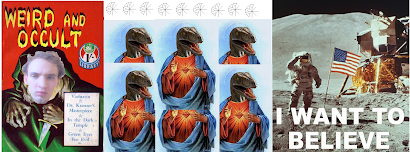An excellent post by Deloras at Chaos Marxism has sparked much discussion, and I suppose I should probably expand and clarify my $0.02 on the subject.
We live mostly not in reality, but in fictional projections of our models of reality. Whenever we make a conscious decision, we are consulting models of reality formed from several sources of information:
1) previous direct experience in analogous situations
2) indirect experience of analogous situations (stories)
3) the interaction between existing models and new experiences (received directly or indirectly) as they interacted at the time of absorption
Now, our models occasionally reject direct experience that conflicts completely with our models. This is useful; our sense organs produce spurious noise much of the time, and so it is very important in a life-or-death situation to have the kind of brain function that will tell you that the shape in the corner of the room is NOT a ghost or a shroud-eater or some even-scarier beast you have been raised to think does not exist, since otherwise you may run into the mouth of a more immediate danger while fleeing a chimera. The veto mechanism can be abused, as is seen in practice by many highly dogmatic systems of thought (obvious examples include the creationists, the Randites, the Randiites, the lifestyle canon-marxists, apple fans, microsoft fans, linux fans, breatharians, and fluffybunny pagan types, but pretty much any subculture with a name consists partially if not mostly of people who will ignore reality that conflicts with their pet models).
There are other ways these systems can be hacked, though. Robert Anton Wilson's epistemological pan-agnosticism, like some less-metaphorical Neo, tries to save people from their own nervous system firewalls by demonstrating how much nonsense they can generate. Unfortunately, dogmatic memeplexes have some pretty intense and potent self-defense systems. Cognitive dissonance may not be a good route either. While I am all for people freeing their minds, a grass-roots free-your-mind movement is probably destined for as much success as the yippie movement's grassroots free-your-mind movement; trickle-up enlightenment is likely to be blocked subconsciously by the < href="http://irreality.me/x/src/127689214971.png">memeplexes that have already infiltrated the highest levels of society. On the other hand, the most active adepts in today's world have already realized how to get people to suspend disbelief long enough to feed them autotoxic memeplexes.
Everyone partakes of fiction, more or less. Fiction provides a language in which the shorthand forms of the everyday umwelt can be slipped to the uninitiated, and designed in such a way that subversions should slip under the radar. All communication is subversion in a sense, and the spectacle can be infected in such a way that it will promote the manipulation of reality tunnels. Like any other living creature, the spectacle will do anything to survive, or die trying. The infectious detournment of fiction made possible by the extensive classification by tropers of the sub-liminal language of modern narrative will not only affect fiction but affect reality.
There are side notes to this, which might be best explored later. I will note them now:
1) One can utilize tvtropes outside of the standard narrative hypersigil workings, since these documents show correlations between entities, qualities, and rituals, as understood under the radar by the hoi polloi.
2) Fiction affects reality through methods not directly mediated by humans. The most obvious example is google-bombing, which on a much more subtle level any piece of fiction that is archived by a search engine as sophisticated as google's will end up doing to some extent -- slightly modifying the results of searches, ad targeting, and even translations.
3) TvTropes itself is highly mutable. Any tvtropes-inspired subversion that gains notability will eventually modify tvtropes itself, and even non-notable narratives can subvert pieces of the narrative spectacle.
Feathers Are One of Evolution’s Best Inventions
-
Really fascinating piece by Michael Habib in Scientific American about how
amazing feathers are: they come in so many different shapes and sizes and
do s...
47 minutes ago
























